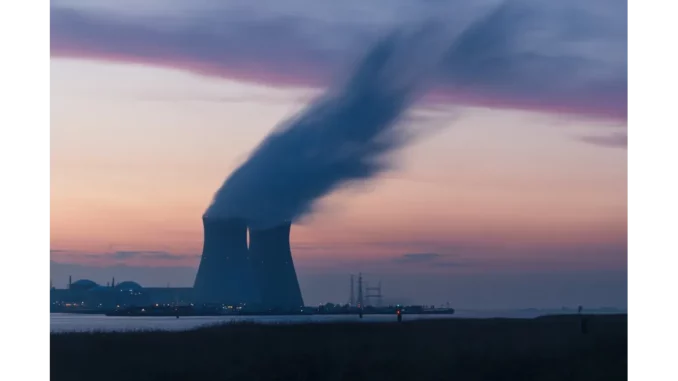
In a recent discussion with Dr. Elizabeth Turner, a leading expert in nuclear energy and a senior researcher at the Bradshaw Advisory, the critical crossroads at which the United Kingdom currently stands in terms of its energy policy was strikingly evident. Dr. Turner illuminated the significant potential of small modular reactors (SMRs) and underscored the importance of learning from historical precedents to avoid squandering what many are calling the UK’s ‘nuclear moment.’
Discover how Focus360 Energy aids sustainable development with Sustainability Statements.
Drawing a parallel to the past, Dr. Turner invoked the example of James Watt, whose revolutionary steam engine, some 260 years ago, became a linchpin of the Industrial Revolution. This innovation provided a reliable and cost-effective energy source that catalysed unprecedented economic growth. Dr. Turner posits that, in 2024, the UK is on the brink of a similar breakthrough with SMRs. Reflecting on Watt’s autobiography, she noted, “Watt’s motivation was to make engines ‘cheap as well as good.’ That lesson is timeless. Affordable, reliable energy is still essential for economic growth. But today, we need our energy to also be secure and clean.”
Dr. Turner emphasised that the contemporary energy landscape has evolved significantly. Today’s energy needs are not just about affordability and efficiency but must also be homegrown to reduce dependence on volatile international markets and free from fossil fuels to mitigate climate change. “SMRs tick all these boxes,” she asserted. Their modular design facilitates iterative learning and improvement, reducing the risk of cost overruns. These reactors can be constructed on a ‘turnkey’ basis, meaning a site is built for an agreed price and then handed over for operation. This method, too risky for gigawatt-scale projects, appears viable for SMRs.
However, the path towards this new nuclear era in the UK is fraught with challenges. A previous government had set an ambitious target of achieving 24GW of nuclear power by 2050, primarily through SMR deployment. Yet, the transition to a new government has left this roadmap uncertain. Dr. Turner stressed the need for comprehensive policy changes to avoid an expensive and protracted transition. “Designating more sites for SMR development is crucial. More sites mean more economic benefits. For instance, Holtec, a US nuclear giant, has committed to building an SMR factory in the UK, potentially generating 3,000 skilled jobs and contributing £1.5 billion in gross value added to the region.”
Public perception and regulatory hurdles also present significant obstacles. Despite nuclear energy being statistically one of the safest sources available, public apprehension remains. Dr. Turner believes that reassuring the public through robust regulation is key. She suggested allocating more resources to nuclear regulators to expedite decision-making and addressing the significant pay disparity within the sector. Streamlining regulations where feasible could also be beneficial. For example, she proposed mutual recognition of work by trusted international regulators, akin to practices in the pharmaceutical industry. If an SMR design is approved in the US or Korea, the UK should not need to duplicate the approval process.
Additionally, Dr. Turner highlighted the necessity for planning reform. She pointed out that consent timelines for clean energy projects and rules around biodiversity need greater flexibility. “If a site isn’t within an area of outstanding natural beauty, environmental impact assessments shouldn’t obstruct the construction of critical infrastructure for achieving Net Zero,” she argued.
The stakes are indeed high. The UK is grappling with its own energy crisis amid a global push to combat climate change. The promise of SMRs offers a beacon of hope – a means to power the nation with energy that is cheap, clean, and secure, while also fostering domestic industrial prowess. Dr. Turner concluded with a poignant reminder: “Britain’s nuclear moment has arrived. But we must seize it. Bureaucratic sluggishness, underfunding, and a lack of vision could result in other countries pulling ahead, leaving us to miss yet another opportunity for growth. SMRs will only thrive if we ramp up the pace and cut the costs.”
As the conversation drew to a close, the historical parallel drawn by Dr. Turner resonated profoundly. Just as James Watt’s steam engine powered the Industrial Revolution, SMRs have the potential to drive a new era of clean, secure, and abundant energy. However, this potential hinges on decisive action and a commitment to overcoming significant hurdles. The UK’s nuclear moment is upon us – the challenge lies in whether we will seize it or let it slip through our fingers.


Be the first to comment